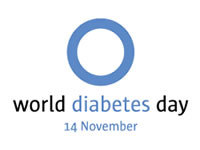Today it is World Diabetes Day
14.11.11

World Diabetes Day raises global awareness of diabetes
According to the International Diabetes Federation (IDF) in 2011, 366 million people have diabetes and by 2030 this will have risen to 552 million.
Diabetes is a chronic disease that occurs either when the pancreas does not produce enough insulin or when the body cannot effectively use the insulin it produces. Insulin is a hormone that regulates blood sugar. Hyperglycaemia, or raised blood sugar, is a common effect of uncontrolled diabetes and over time leads to serious damage to many of the body’s systems, especially the nerves and blood vessels.
There are three main types of diabetes:
• type 1 diabetes
• type 2 diabetes
• gestational diabetes mellitus (GDM)
The situation in Europe
In Europe, the IDF estimates that, in 2011, 6.7% of the adult population in Europe, amounting to 63 million people, are living with diabetes. This is 17.2% of people living with diabetes globally.
Direct healthcare costs of diabetes-related illnesses range between 2.5% to 15% of country’s annual healthcare budget.
The IDF estimates that global healthcare expenditures to manage diabetes and prevent its complications are expected to total at least USD 465 billion in 2011. By 2030, this number is projected to exceed some USD 595 billion.
An ageing population – and the rising number of adults and children who are overweight or obese – will see increasing numbers of people at risk of Type 2 diabetes.
Medical experts say that Type 2 diabetes can be prevented through changes in lifestyle – such as improving diet or taking more exercise.
Watch below the IDF video that brings four headline messages to the world from the global diabetes community:
Industry also committed to tackle chronic diseases.
According to our sister association PhRMA, nearly 235 medicines are in development to to Treat Diabetes and Related Conditions.
The new medicines in development include:
• A once-weekly medicine that is an analog of a natural human hormone that plays a significant role in blood sugar regulation.
• A drug that addresses the underlying cause of type 2 diabetes by modulating genes responsible for insulin sensitization.
• A once-daily medicine that selectively inhibits a protein associated with glucose metabolism, but not other related proteins associated with other biologic activity.
For further information:
– The International Diabeted Federation website.
– The World Health Organisation website.
– The European Commission Innovation and Research Page.
